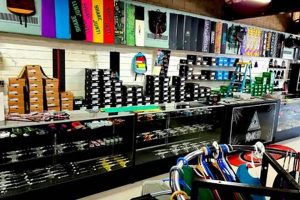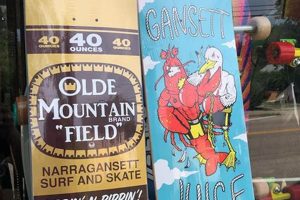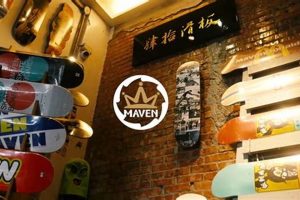A retail establishment in New York’s capital region caters to individuals involved in skateboarding. The business provides equipment, apparel, and accessories related to the sport, serving both amateur and professional skateboarders in the local community. Its location within Albany makes it accessible to residents of the city and surrounding areas looking to purchase skateboarding-related merchandise.
Such an enterprise plays a vital role in fostering the skateboarding culture within its locality. It offers a physical space for enthusiasts to acquire necessary gear, connect with like-minded individuals, and gain insights into the latest trends and techniques. Furthermore, it may contribute to the local economy through retail sales and potential employment opportunities. The existence of these specialty shops reflects the continuing popularity and relevance of skateboarding as a recreational activity and subculture.
The following sections will delve into specific aspects of skateboarding retail, including product offerings, community engagement strategies, and the evolving landscape of the industry.
Skateboarding Equipment and Maintenance Tips
The following guidelines address essential aspects of skateboarding equipment selection and upkeep. Adherence to these recommendations can enhance performance and extend the lifespan of skateboarding gear.
Tip 1: Deck Selection: Consider the deck’s width and length based on individual foot size and skating style. Wider decks offer greater stability, while narrower decks facilitate quicker maneuverability. Experimentation is crucial to finding the optimal fit.
Tip 2: Truck Maintenance: Regularly inspect truck hardware for looseness. Tighten kingpins and axle nuts as needed to maintain stability. Avoid over-tightening, which can damage the bushings and hinder turning ability.
Tip 3: Wheel Choice: Select wheel durometer (hardness) based on the intended skating surface. Softer wheels provide better grip on rough surfaces, while harder wheels offer greater speed on smooth surfaces.
Tip 4: Bearing Care: Periodically clean and lubricate bearings to ensure smooth wheel rotation. Remove bearings from wheels, clean with a solvent, and re-lubricate with skate-specific oil or grease.
Tip 5: Grip Tape Application: Apply grip tape carefully to ensure a uniform, bubble-free surface. Proper grip tape application enhances board control and prevents slippage.
Tip 6: Hardware Inspection: Routinely inspect all hardware, including mounting bolts and screws, for wear and tear. Replace any damaged or missing hardware immediately to prevent accidents.
Tip 7: Protective Gear: Always utilize appropriate protective gear, including a helmet, knee pads, and elbow pads. Prioritizing safety minimizes the risk of injury during skateboarding activities.
Proper equipment selection and consistent maintenance are fundamental to a positive and safe skateboarding experience. By following these guidelines, skateboarders can optimize their performance and prolong the life of their equipment.
The subsequent sections will focus on the specific community engagement and offerings related to skateboarding shops.
1. Local Skateboarding Community
The relationship between a skateboarding shop and its surrounding skateboarding community is symbiotic. The presence of the business directly impacts the community by providing access to necessary equipment, acting as a social gathering point, and often sponsoring local events. For example, a shop may organize skateboarding competitions at a local park or offer workshops on board maintenance, directly contributing to the community’s growth and skill development.
The local skateboarding community, in turn, significantly affects the success and sustainability of the retail operation. A strong, active community provides a consistent customer base, generates word-of-mouth marketing, and supports the shop’s reputation. Consider a scenario where a local skate crew consistently purchases decks, wheels, and apparel from a specific shop; this patronage not only ensures revenue but also fosters a sense of loyalty and belonging among skaters. Furthermore, the shop’s ability to adapt to the community’s specific needs and preferencessuch as stocking particular brands or hosting events that cater to local interestsis critical for long-term success.
Understanding this dynamic is of practical significance for both the business owner and members of the skateboarding community. By recognizing the importance of community engagement and responsiveness, the shop can solidify its position as a vital resource. Simultaneously, skaters can appreciate the role of the retail establishment in supporting their passion and fostering a sense of unity. A well-nurtured relationship benefits all stakeholders, ensuring the continued vitality of the local skateboarding scene.
2. Retail Skateboarding Equipment
The availability of skateboarding equipment through retail channels is a fundamental aspect of supporting the skateboarding community. A physical retail location facilitates the acquisition of essential gear, allowing customers to assess products firsthand and receive expert advice. The connection between retail offerings and the skateboarding experience is direct and significant.
- Deck Variety and Customization
Skate shops typically offer a range of skateboard decks in varying sizes, shapes, and materials. This selection allows skaters to choose a deck that suits their individual style and physical attributes. Customization options, such as grip tape application and graphic selection, further personalize the skateboarding experience. A retailer can provide the means to assemble a skateboard tailored to specific performance needs.
- Truck and Wheel Selection
Trucks and wheels are critical components affecting a skateboard’s handling and performance. Retailers offer a selection of trucks in different widths and heights to match deck size and intended use. Wheel selection encompasses a range of durometers (hardness) and sizes to optimize grip and speed for various terrains. The ability to select appropriate trucks and wheels is essential for achieving desired skateboarding characteristics.
- Hardware and Bearing Accessibility
Hardware, including nuts, bolts, and bearings, are necessary for assembling and maintaining a skateboard. Retailers provide access to these components, ensuring that skaters can replace worn or damaged parts. High-quality bearings contribute to smoother wheel rotation and increased speed, directly impacting the skateboarding experience.
- Protective Gear Availability
Helmets, knee pads, elbow pads, and wrist guards are essential for minimizing the risk of injury during skateboarding activities. Retailers offer a range of protective gear in various sizes and styles, encouraging skaters to prioritize safety. Access to appropriate protective equipment promotes responsible skateboarding practices.
These facets of retail skateboarding equipment underscore the role of a physical establishment in supporting the sport. By providing a comprehensive selection of gear, accessories, and protective equipment, a retailer contributes to the accessibility, safety, and overall experience of skateboarding.
3. Albany Business Presence
The presence of a skateboarding-related business within Albany’s commercial ecosystem signifies more than simply a retail outlet. It represents an economic entity with connections to the local community, municipal regulations, and the overall character of the city. Examining its business presence reveals its interwoven relationship with Albany.
- Tax Revenue Contribution
The business generates tax revenue for the city through sales taxes collected on transactions. These revenues contribute to Albany’s municipal budget, funding public services such as infrastructure maintenance, public safety initiatives, and community programs. A sustained, profitable business operation directly benefits the city’s financial stability.
- Employment Opportunities
The establishment offers employment opportunities to local residents, including sales associates, managers, and potentially skilled technicians for board repairs or customization. These jobs provide income for Albany residents, contributing to the local economy and reducing unemployment rates. The creation of even a small number of jobs can have a positive ripple effect within the community.
- Commercial Property Utilization
Occupying a commercial space within Albany, the business contributes to the utilization of existing infrastructure and the vitality of commercial districts. Its presence may attract foot traffic to a specific area, benefiting neighboring businesses and enhancing the overall appeal of the city’s retail environment. A well-maintained and active storefront improves the aesthetics of the surrounding area.
- Compliance with Local Regulations
The business operates under Albany’s regulatory framework, adhering to zoning laws, licensing requirements, and health and safety standards. Compliance with these regulations ensures that the business operates responsibly and contributes to the overall order and safety of the city. Its adherence to local ordinances demonstrates its commitment to being a responsible member of the Albany business community.
These interwoven facets of “Albany Business Presence” underscore the tangible impact of such retail establishment. It is not merely a place to purchase skateboarding equipment, but an active participant in the economic and social fabric of the City of Albany.
4. Skate Culture Hub
The designation of a retail establishment as a “Skate Culture Hub” implies its function extends beyond mere commercial transactions. In this context, the subject functions as a focal point for the local skateboarding community. This manifests in various ways, including organized events, providing a space for skaters to convene, and offering resources beyond the direct sale of merchandise. The store’s physical space becomes a location where individuals connect, exchange knowledge, and foster shared identity centered on skateboarding. For example, it might host skateboarding video premieres, board repair clinics, or provide a meeting point for skaters planning sessions at local skateparks.
The importance of this cultural function is linked to the sustainability of the skateboarding scene. By actively fostering community engagement, the business strengthens the skateboarding ecosystem within Albany. This creates a reinforcing cycle: a stronger community leads to greater interest in the sport, which, in turn, supports the shops business operations. Furthermore, the establishment serves as a conduit for transmitting skateboarding knowledge and values to younger generations. Experienced skaters may mentor newcomers, promoting safety and ethical conduct within the sport. This transmission process relies on a physical space where such interactions can occur organically. A practical example can be seen in the form of mentoring, as seasoned members of the local scene offer guidance to newer skaters, embedding safety and ethical skating etiquette.
Comprehending the implications of “Skate Culture Hub” is vital for appreciating the business’s contribution. Challenges exist in consistently maintaining this role, requiring ongoing effort in community engagement and resource allocation. Failure to prioritize the cultural component could lead to a decline in community engagement and, ultimately, a weakening of the skateboarding scene it aims to serve. However, by embracing its role as more than simply a retailer, the Albany business enhances its own long-term viability and contributes to the overall well-being of the local skateboarding landscape.
5. Specialized Product Offerings
The availability of specialized merchandise is a defining characteristic of any retail establishment catering to a niche market. In the context of skateboarding, “Specialized Product Offerings” represent a curated selection of equipment and accessories designed to meet the specific needs and preferences of skateboarders, setting this establishment apart from general sporting goods retailers. For the Albany skate shop, it serves as the heart of the store’s selection for local skate culture.
- Limited Edition Decks and Collaborations
Skate shops often stock limited edition decks featuring artwork from local artists or collaborations with skateboarding brands. These decks appeal to collectors and skaters seeking unique and visually distinctive equipment. The presence of such items differentiates the retail establishment from mass-market outlets, fostering a sense of exclusivity and connection to the local art scene. For example, it might carry limited edition decks with graphics from a local artist, which makes it the center of the community’s skateboard art.
- Performance-Oriented Hardware and Components
Beyond standard equipment, specialized product offerings include high-performance trucks, wheels, and bearings designed for specific skateboarding styles. These components cater to experienced skaters seeking to optimize their board’s handling and performance. The provision of such items positions the retail establishment as a source of expertise and high-quality gear. The establishment is seen as an authoritative resource for performance-enhancing products.
- Skateboarding Apparel and Footwear
Skateboarding-specific apparel and footwear are integral to the skateboarding culture. Retail establishments often carry brands renowned for their durability, functionality, and aesthetic appeal within the skateboarding community. This merchandise extends the retail offering beyond equipment, providing a comprehensive selection for skaters’ needs. Specific shoe brands known for their durability and board feel are carried.
- Board Customization Services and Components
Beyond selling complete skateboards, a shop may provide customization services, assisting customers in selecting and assembling individual components to create a personalized setup. This may include expert advice on deck size, truck width, and wheel durometer, ensuring that the final product meets the skater’s specific requirements. This allows consumers to build boards tailored to their particular styles and preferences. Board building service provides opportunities for personalising the setup.
The “Specialized Product Offerings” significantly contribute to its identity and appeal within the local skateboarding community. By curating a selection of unique, high-performance, and culturally relevant items, the shop caters to the diverse needs and preferences of skaters in Albany, solidifying its position as a vital resource for the skateboarding scene. The shop’s selection of goods ensures it provides skaters with the highest quality experience.
Frequently Asked Questions
The following section addresses common inquiries pertaining to skateboarding retail, equipment, and community engagement. The information is presented to provide clarity and understanding of core concepts.
Question 1: What constitutes a suitable skateboard deck for a beginner?
A beginner skateboarder benefits from a deck of appropriate width, typically between 7.75 and 8.25 inches, depending on foot size and personal preference. A standard shape with a moderate concave is also advisable to facilitate easier learning of basic maneuvers. It is important to prioritize a deck constructed from high-quality maple for durability.
Question 2: How frequently should skateboard bearings be cleaned and lubricated?
Skateboard bearings should be cleaned and lubricated every few weeks with regular use. This frequency may increase based on environmental conditions, such as exposure to dirt, sand, or water. Maintaining clean and lubricated bearings ensures optimal wheel performance and extends their lifespan.
Question 3: What safety equipment is essential for skateboarding?
Essential safety equipment includes a properly fitted helmet, knee pads, and elbow pads. Wrist guards are also recommended, particularly for beginners. The consistent use of protective gear minimizes the risk of injury during skateboarding activities.
Question 4: How should skateboard trucks be adjusted for optimal performance?
Skateboard trucks should be adjusted based on individual skating style and terrain. Looser trucks facilitate easier turning, while tighter trucks provide greater stability. Kingpin tightness should be adjusted incrementally, ensuring that bushings are not overly compressed. Balanced truck adjustments are crucial for maintaining control and preventing wobbling.
Question 5: What are the key differences between various skateboard wheel durometers?
Skateboard wheel durometers, measured on the A scale, indicate wheel hardness. Lower durometer wheels (e.g., 78A-85A) are softer and provide better grip on rough surfaces. Higher durometer wheels (e.g., 95A-101A+) are harder and offer greater speed on smooth surfaces. Wheel durometer selection depends on the intended skating environment and desired performance characteristics.
Question 6: How can a skateboard shop contribute to the local skateboarding community?
A skateboard shop can contribute to the local skateboarding community by sponsoring events, offering workshops, supporting local skaters, and providing a gathering space for enthusiasts. Actively engaging with the community fosters a sense of belonging and promotes the growth of skateboarding culture. These shops act as a communal catalyst.
The provided information serves as a foundational guide to understanding common aspects of skateboarding equipment, maintenance, and community involvement. Consult with experienced skateboarders or retail professionals for further guidance tailored to individual needs.
The following content provides a summary to close this article.
Conclusion
The preceding analysis has illuminated the multifaceted role the business performs within Albany’s skateboarding ecosystem. This retail establishment provides essential equipment, cultivates the local skateboarding community, supports the city’s economy, acts as a vital cultural hub, and offers specialized products tailored to the needs of skateboarders. The synergy of these elements establishes its significance beyond simple retail.
Continued support from the local skateboarding community and active engagement with the broader Albany area are critical to the sustained success of this operation. Further investment in community programs, product innovation, and responsible business practices will enhance its value and solidify its position as a cornerstone of skateboarding culture within the region. The longevity of such establishments hinges upon their ability to remain relevant and responsive to the evolving needs of the communities they serve.







